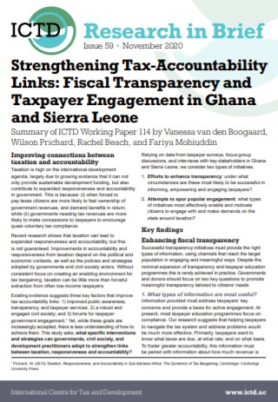Research in Brief 59
Taxation is high on the international development agenda, largely due to growing evidence that it can not only provide sustainable development funding, but also contribute to expanded responsiveness and accountability in government. This is because: (i) when forced to pay taxes citizens are more likely to feel ownership of government revenues, and demand benefits in return, while (ii) governments needing tax revenues are more likely to make concessions to taxpayers to encourage quasi-voluntary tax compliance. Recent research shows that taxation can lead to expanded responsiveness and accountability, but this is not guaranteed. Improvements in accountability and responsiveness from taxation depend on the political and economic contexts, as well as the policies and strategies adopted by governments and civil society actors. Without consistent focus on creating an enabling environment for tax bargaining, taxation can be little more than forceful extraction from often low-income taxpayers. Existing evidence suggests three key factors that improve tax-accountability links: 1) improved public awareness, transparency, and taxpayer services; 2) a robust and engaged civil society; and 3) forums for taxpayer-government engagement. Yet, while these goals are increasingly accepted, there is less understanding of how to achieve them. This study asks, what specific interventions and strategies can governments, civil society, and development practitioners adopt to strengthen links between taxation, responsiveness and accountability? Relying on data from taxpayer surveys, focus group discussions, and interviews with key stakeholders in Ghana and Sierra Leone, we consider two types of initiatives. 1. Efforts to enhance transparency: under what circumstances are these most likely to be successful in informing, empowering and engaging taxpayers? 2. Attempts to spur popular engagement: what types of initiatives most effectively enable and motivate citizens to engage with and make demands on the state around taxation? This is a summary of ICTD Working Paper 114 by Vanessa van den Boogaard, Wilson Prichard, Rachel Beach, and Fariya Mohiuddin.
